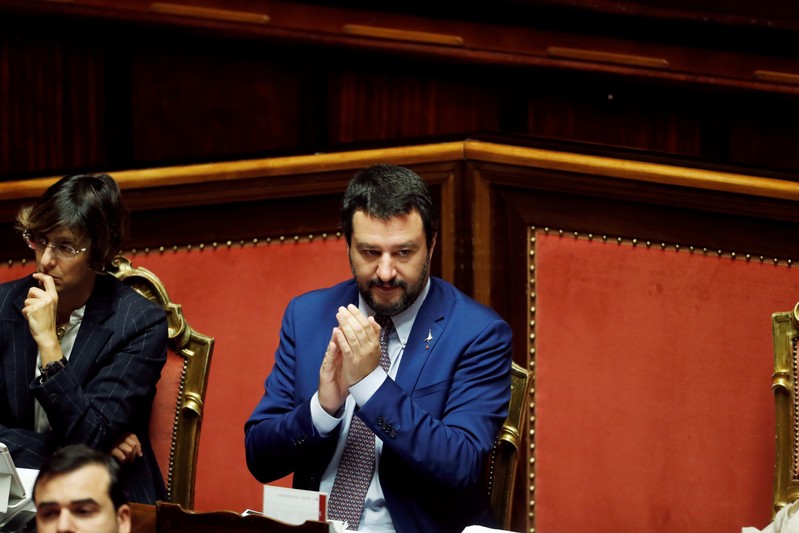
Interior Minister Matteo Salvini gestures before a confidence vote in the upper house Senate in Rome, Italy, November 7, 2018. REUTERS/Remo Casilli
November 8, 2018
By Crispian Balmer and Giuseppe Fonte
ROME (Reuters) – Italy’s ruling coalition reached a deal on Thursday over removing time constraints on the prosecution of numerous crimes, including corruption, defusing a row that had threatened the stability of the government.
The dispute over the so-called statute of limitations was the most serious so far to rattle the coalition, which took office in June promising to bring radical change to Italy.
Time limits for prosecutions has been at the center of fierce political debate for years, with magistrates saying it is all but impossible to reach a definitive verdict for a multitude of financial crimes within the prescribed time frame.
The ruling 5-Star Movement, which has made battling graft a priority, wants to remove many of the limits as soon as possible. Its coalition partner, the League, has previously resisted change, saying it would leave too many defendants facing years of legal uncertainty.
Under the terms of Thursday’s accord, reached at an early morning meeting of key government figures, the statute will be relaxed by parliament this year but the change will only come into force in 2020 when a broad legal reform is enacted.
“The statute of limitations is a bitter poison to swallow. Every case that is curtailed is justice denied. Now, finally this is coming to end,” 5-Star leader Luigi Di Maio wrote on Facebook.
In a newspaper interview published earlier on Thursday, Di Maio had warned the coalition would collapse if the League had refused to endorse the overhaul of time restrictions.
Italy’s justice system has long been one of the most dysfunctional in Europe, with a backlog of an estimated eight million cases gumming up the law courts.
LIMBO
According to the latest data available, some 145,637 cases fell by the wayside in 2016 after hitting the time out.
One notable beneficiary of the statute of limitations has been former prime minister Silvio Berlusconi, who has seen more than 10 trials against him collapse because of time constraints, most recently in July when a three-year prison term for bribing a senator was swept away.
Lawmakers in Berlusconi’s Forza Italia (Go Italy!) party denounced Thursday’s move to relax the time rules. “Shame, shame,” a group of politicians yelled in the lower house of parliament, forcing the sitting to be suspended.
Forza Italia has long been a political ally of the League and they ran together in March elections. However, 5-Star ruled out joining forces with Berlusconi after the vote, saying it was only willing to form a coalition with the League.
Unlike other major Western countries, the legal clock in Italy starts when a crime is committed and keeps ticking until the statute of limitations runs out. That gives every incentive for a defendant to prolong proceedings, according to lawyers.
However, lawyers say open-ended cases will enable prosecutors to drag out hearings and leave defendants in limbo, looking to pressure them into eventual plea bargains.
The 5-Star says it wants the statute of limitations to be frozen at the end of an initial trial to ensure that once a verdict is reached the appeals process can continue unabated.
Under Italian law, defendants have a right to two appeals before a verdict becomes definitive. Likewise, prosecutors can appeal non-guilty verdicts.
According to latest EU data, Italy has the slowest legal system in the 27-nation block, with more than 1,400 days needed on average to complete civil and commercial cases. The vast majority of countries needed under 400 days to wrap up trials.
(Editing by Marie-Louise Gumuchian)

